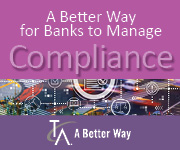| Past Issues | Subscribe | ABA Bank Compliance magazine | ABA Banking Journal | ||||||||||||||||||
 |
||||||||||||||||||
June 6, 2025 |
||||||||||||||||||
|
This post is part of a series exploring what U.S. regulators should prioritize as they consider Basel III Endgame implementation. Here, we focus on the need to modernize the Regulatory Consistency Assessment Programme (RCAP) so that it evaluates substance over form and gives proper credit for the extremely robust and conservative national framework applied in the U.S.
This post continues our series looking at how U.S. regulators can use this moment to promote a more coherent and credible capital framework. If U.S. regulators move forward on the Basel III endgame, they must roll back redundant rules that overcomplicate the capital framework.
Ensuring appraisals and other types of property valuations are accurate is not just about fair lending.
Roughly three in four Americans believe that financial institutions should be most responsible for keeping consumers safe from scams, according to a new survey by Morning Consult and Google. The survey polled consumers in the U.S., U.K. and India about their experiences with scams. Sixty percent of U.S. respondents perceived an increase in scam attempts over the past year.
The ABA has suggested the Financial Crimes Enforcement Network make several revisions to its beneficial ownership information rule to ease the burden of its reporting requirements, including exempting banks from the definition of "beneficial owner."
The Consumer Financial Protection Bureau asked a federal court to vacate its rule on financial data sharing, citing the rule’s "numerous legal infirmities." The 2024 rule implemented Section 1033 of the Dodd-Frank Act, which requires banks and other financial institutions to make a consumer’s financial information available to them or a third party at the consumer’s direction.
In recent years, the Department of Justice has targeted banks for alleged racial redlining for conduct that does not constitute redlining, raising serious legal and constitutional questions, according to a new report authored by a civil rights legal expert for the ABA.
The Labor Department has rescinded a 2022 compliance release that directed fiduciaries to exercise "extreme care" before adding a cryptocurrency option to a 401(k) plan’s investment menu for plan participants.
Virtual June 25 July 16 July 23 August 20 |
||||||||||||||||||







